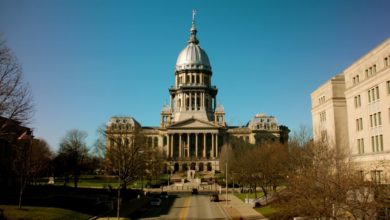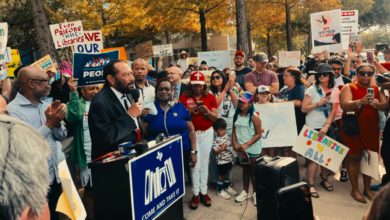City College of San Francisco students, teachers, staff and community members voiced their concerns at a Sept. 11 Board of Trustee’s meeting regarding the appointment of a special trustee as a “consultant.” The pending appointment follows a 14-point critique that the Accrediting Commission for Community and Junior Colleges—an affiliate of the Accrediting Commission for Schools, Western Association of Schools and Colleges—issued to City College in July.
ACCJC and WASC are private entities appointed by the state’s Department of Education that accredit schools. Funding for public schools is based on their accreditations. The ACCJC threatens to yank CCSF’s accreditation unless it complies with the 14 points, most of which involve funding. These private institutions, which play no part in the education of students, claim the right to tell teachers, students and staff how to run their schools!
The 14-point critique is not designed to improve or accelerate learning. Implementing the recommendations would instead negatively affect the ability of poor and working people to afford a good education such as City College strives to provide. It would cut enrollment and classes, especially noncredit classes like English as a Second Language and vocational courses. The result would be increased class sizes and the inability of many students to complete their courses without additional financial aid.
These cuts would also make it harder for students to complete credit courses required in order to transfer to a California State University or University of California—one of the major concessions that created the City/Community College system in the first place.
Faculty and classified staff personnel face more cuts on top of the many already imposed since the beginning of the 2008 economic crisis. Faculty health care benefits are threatened, as CCSF is one of the only community colleges in California that offer health care benefits for part-time faculty.
Right to public education under attack
Like other community colleges and K-12 public schools, City College finds more than ever that the right to public education is under attack. Until a century or so ago, generally only the children of the well-to-do went beyond elementary school. Apartheid Jim Crow laws restricted education for African American children until a half-century ago. The idea that working-class children should be able to go to college only became a reality with the advent of the GI Bill of 1943 which enabled WW II veterans to go to college for free and later as a result of the civil rights movement of the 1960s.
Now, these gains are under attack. Education is being slashed at every level from pre-school through university. The new escalation by ACCJC against City College, an invaluable public institution with more than 90,000 students, is being used to spearhead more cuts aimed at further privatizing education.
According to former lawyer for ACCJC Kathleen Carol, speaking at an “Occupy Education” forum in August, ACCJC President Barbara Benno has used her position to gut funding for community colleges. Benno’s sanction rates for California community colleges, based on student loan defaults, are six times higher than any other in the country.
Jack Scott, former state chancellor and a major supporter of ACCJC, initiated the “student success task force” that has been pushing a sweeping package of budget-cutting measures. These measures purportedly increase the chances of students graduating or completing their certificates on time—enabling the state to spend less on students per year regardless of the quality of education.
The appointment of a special trustee is the most recent development in the “Save City College” struggle. The state has billed this latest attack as a “choice.” CCSF can “choose” to accept a state-imposed special trustee or “choose” their own volunteer trustee. The latter was championed by the majority of CCSF’s Board of Trustees on grounds it would allow them to retain veto power over the trustee’s decisions, whereas they would have no veto power over decisions of the former “choice.”
However, there was no clear answer to the questions raised at the board meeting regarding what the cost would be for the special trustee, nor the length of term, nor the ability to “recall” the trustee if he or she proved incompetent.
Appointment of a special trustee is a step closer to the board accepting the ACCJC’s funding cuts. Students, teachers, classified staff and the San Francisco Bay Area community are fighting back. The fight-back includes organizing direct action interventions like the one at the Sept. 11 meeting. There students held their own “Trustee” meeting where their concerns were voiced and they discussed alternative funding measures like the millionaires’ tax, the parcel tax
(a form of property tax, which must be paid by the owners of parcels of real estate) and finding an acceptable volunteer special trustee.
Such actions and measures are important in the fight to save City College. But the fight against the budget cuts hitting CCSF and public education in general requires that students, teachers, staff and the community unite in the streets to demand that education is a right! Stop the cuts; the money is there!
Students and former students across the United States owe the big banks and other financial entities over $1 trillion just because they decided to pursue a higher education. According to a Business Day Live report, 37 million students have federal loans, with nearly 6 million either in default or more than 12 months behind in payments.
The average student graduates with about $25,000 of debt, since roughly two out of three have to take out loans to go to school. Adjusted for inflation, average indebtedness has doubled over the last decade. Student loan debt is the second largest source of private debt in the country, recently surpassing credit card, auto loans and home equity debt.
Student debt could be immediately forgiven, and City College of San Francisco could ignore ACCJC and be fully funded if we seized the banks and taxed the rich. By expropriating the banks, we would remove private profit from the equation, and decisions could instead be based on satisfying human needs.





